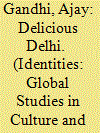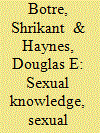| Srl | Item |
| 1 |
ID:
144172


|
|
|
|
|
| Summary/Abstract |
This article examines how Old Delhi is represented and recreated in contemporary India. Delhi’s old city was once the locus of pre-colonial Mughal sovereignty. It is now often encountered via nationalist spectacles, mass-media images and consumption practices. Paralleling neo-liberalism’s onset in the 1990s, its street food, bazaar spaces and historical monuments have been avidly appropriated by reigning institutions and classes. Old Delhi suggests that which the new India has left behind; yet this displacement also elicits longing for what has been lost.
This medieval remnant can therefore be considered the site of nostalgia consumed by a globalised middle class. This article presents an ethnography of Old Delhi’s invocation in New Delhi’s cultural landscape, including malls, newspapers, heritage sites, hotels, and food courts. In triangulating among the realms of nationalist nostalgia, middle-class identity and mediated consumption, it emphasises how India’s neoliberal emergence is bound up with the co-opting of the past.
|
|
|
|
|
|
|
|
|
|
|
|
|
|
|
|
| 2 |
ID:
155121


|
|
|
|
|
| Summary/Abstract |
This article examines letters written by young men to the Marathi-language journal Samaj Swasthya and its editor, R. D. Karve, a major advocate of birth control and sex education in western India. The letters, and Karve's responses to them, constituted perhaps the earliest sex-advice column in Indian print media. We argue here that the correspondence provides a unique vehicle for understanding the forms of sexual knowledge held by middle-class males in mid-twentieth-century India as well as for appreciating their most significant sexual anxieties. The article analyses the concerns expressed in the letters about masturbation and seminal emissions, the nature of the female body and processes of conception, birth control and same-sex sexual practices. It particularly illuminates the ways in which the concept of modern conjugality pervaded the sexual understandings of the young men who wrote to Karve. It thus offers valuable insights into specifically sexual aspects of conjugality and masculinity—aspects that have previously been unexplored.
|
|
|
|
|
|
|
|
|
|
|
|
|
|
|
|